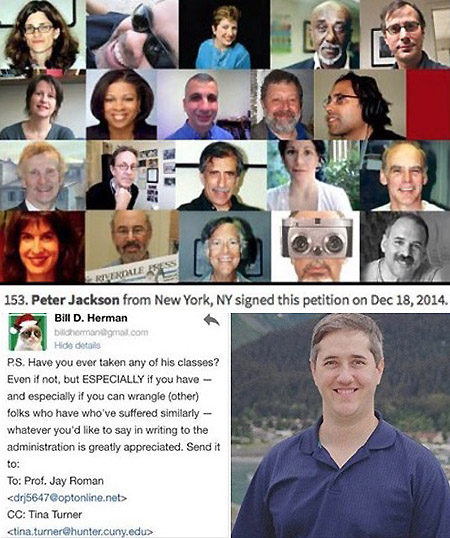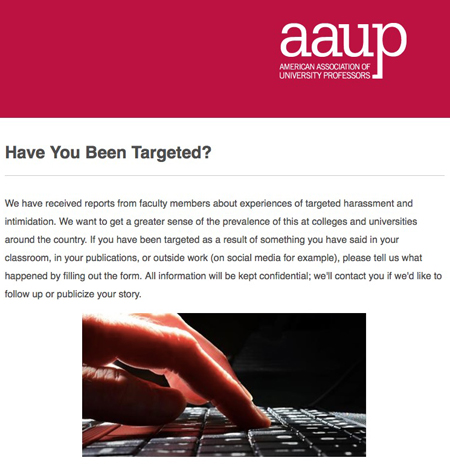Archive for the ‘Academic Nepotism Breeds Academic Corruption’ Category
A Colleague Who Is a Tenured Lecturer (But Calls Himself a Professor on Linkedin) Files a Complaint with Hunter College Public Safety Complaining That This Colleague Won’t Allow Him to Write Posts on This Blog. The Complaining Colleague Lied in the Complaint. Should He Be Investigated?
Care to Comment Colleague Larry Shore?
Saturday, February 17th, 2018
Tags:Academic Bullying, Andrew J Polsky New York State Assembly, Andrew Lund, Arnold Gibbons, Bernard Stein, Bill Williams, Billy d Herman, campus bullying, Christa Davis Acampora, Eija Ayravainen, Faculty Delegate Assembly, FDA, Greggory w Morris, Gustavo Mercado, Harold Newman Dean of the School of Arts & Sciences, Hunter College, HUnter College Faculty Delegate Assembly, Hunter College FDA President, Hunter College Ombuds Office, Hunter College Ombudsman, Hunter College Senate, Hunter College Senate Chair, Isabel c Pinedo, Ivone Margulies, James B. Milliken, James Roman, Jennifer Raab, Joe McElhaney, Joel Zuker, John Wallach, Karen Hunter, Kelly Anderson, Larry Shore, LumpenGoombah, LumpenGoombahAwards, Martin Lucas, Mick Hurbis-Cherrier, New York Healthy Workplace Advocates, New York State Senate, Peter Jackson, Peter Parisi, Professional Staff Congress, PSC, Ricardo Miranda, Robert Stanley, S3863/A4965 – The NYS Healthy Workplace Bill, Shanti k Thakur, Sissel McCarthy, Sissell McCarthy, Steve Gorelick, Stuart Ewen, Tami Gold, The Peter Jackson Who Signed the Moveon.org Petition, Thomas DeGloma, Timothy Portlock, Tony Doyle, Vita C. Rabinowitz, workplace bullying
Posted in Academic Bullying, Academic Nepotism Breeds Academic Corruption, Blogroll, Dirty Linen: Silence=Complicity, Dogfighting in the Department of Chimera, It Was One of Those Semesters, It's Been One of Those Semesters, The Controversy Continues, Wooly Bully, Workplace Bullying | Comments Closed
Protected: Draft: Open Letter to City University of New York Chancellor James B. Milliken Who Recently Announce That He Was Stepping Down at the End of This Semester
Sunday, November 26th, 2017Tags:Academic Bullying, Andrew J Polsky New York State Assembly, Andrew Lund, Arnold Gibbons, Bernard Stein, Bill Williams, Billy d Herman, campus bullying, Christa Davis Acampora, Eija Ayravainen, Faculty Delegate Assembly, FDA, Greggory w Morris, Gustavo Mercado, Harold Newman Dean of the School of Arts & Sciences, Hunter College, HUnter College Faculty Delegate Assembly, Hunter College FDA President, Hunter College Ombuds Office, Hunter College Ombudsman, Hunter College Senate, Hunter College Senate Chair, Isabel c Pinedo, Ivone Margulies, James B. Milliken, James Roman, Jennifer Raab, Joe McElhaney, Joel Zuker, John Wallach, Karen Hunter, Kelly Anderson, Larry Shore, LumpenGoombah, LumpenGoombahAwards, Martin Lucas, Mick Hurbis-Cherrier, New York Healthy Workplace Advocates, New York State Senate, Peter Jackson, Peter Parisi, Professional Staff Congress, PSC, Ricardo Miranda, Robert Stanley, S3863/A4965 – The NYS Healthy Workplace Bill, Shanti k Thakur, Sissel McCarthy, Sissell McCarthy, Steve Gorelick, Stuart Ewen, Tami Gold, The Peter Jackson Who Signed the Moveon.org Petition, Thomas DeGloma, Timothy Portlock, Tony Doyle, Vita C. Rabinowitz, workplace bullying
Posted in 30-40P, Academic Bullying, Academic Nepotism Breeds Academic Corruption, Blogroll, Dogfighting in the Department of Chimera, It Was One of Those Semesters, It's Been One of Those Semesters, Wooly Bully, Workplace Bullying | Comments Closed
Protected: Is the Dog Fight Still on in the Department of Chimera?
Wednesday, September 27th, 2017Posted in Academic Bullying, Academic Nepotism Breeds Academic Corruption, Blogroll, Dogfighting in the Department of Chimera, It Was One of Those Semesters, It's Been One of Those Semesters, Wooly Bully, Workplace Bullying | Comments Closed
University of Chicago:
Studying Lists of Last Names Reveal Hiring Practices in Higher Education
Monday, July 24th, 2017
Tags:Academic Bullying, Andrew J Polsky New York State Assembly, Andrew Lund, Arnold Gibbons, Bernard Stein, Bill Williams, Billy d Herman, campus bullying, Christa Davis Acampora, Eija Ayravainen, Faculty Delegate Assembly, FDA, Greggory w Morris, Gustavo Mercado, Harold Newman Dean of the School of Arts & Sciences, Hunter College, HUnter College Faculty Delegate Assembly, Hunter College FDA President, Hunter College Ombuds Office, Hunter College Ombudsman, Hunter College Senate, Hunter College Senate Chair, Isabel c Pinedo, Ivone Margulies, James B. Milliken, James Roman, Jennifer Raab, Joe McElhaney, Joel Zuker, John Wallach, Karen Hunter, Kelly Anderson, Larry Shore, LumpenGoombah, LumpenGoombahAwards, Martin Lucas, Mick Hurbis-Cherrier, New York Healthy Workplace Advocates, New York State Senate, Peter Jackson, Peter Parisi, Professional Staff Congress, PSC, Ricardo Miranda, Robert Stanley, S3863/A4965 – The NYS Healthy Workplace Bill, Shanti k Thakur, Sissel McCarthy, Sissell McCarthy, Steve Gorelick, Stuart Ewen, Tami Gold, The Peter Jackson Who Signed the Moveon.org Petition, Thomas DeGloma, Timothy Portlock, Tony Doyle, Vita C. Rabinowitz, workplace bullying
Posted in Academic Bullying, Academic Nepotism Breeds Academic Corruption, Blogroll, Dogfighting in the Department of Chimera, The Controversy Continues, Wooly Bully, Workplace Bullying | Comments Closed
Sunday, March 5th, 2017
Posted in Academic Bullying, Academic Nepotism Breeds Academic Corruption, Blogroll, Dogfighting in the Department of Chimera, I Recall the Moment, It Was One of Those Semesters, It's Been One of Those Semesters, The Controversy Continues, The March 11 D:F/M Faculty Meeting, Wooly Bully, Workplace Bullying | Comments Closed
Minding the Workplace: Suggestions for Those in Need of Assistance for a Workplace Bullying, Mobbing, or Abuse Situation.
Sunday, December 25th, 2016The resources may be helpful. Click here for good information.

Gregg Morris, editor, the WORD & this site and others.
Tags:Academic Bullying, Andrew J Polsky New York State Assembly, Andrew Lund, Arnold Gibbons, Bernard Stein, Bill Williams, Billy d Herman, campus bullying, Christa Davis Acampora, Eija Ayravainen, Faculty Delegate Assembly, FDA, Greggory w Morris, Gustavo Mercado, Harold Newman Dean of the School of Arts & Sciences, Hunter College, HUnter College Faculty Delegate Assembly, Hunter College FDA President, Hunter College Ombuds Office, Hunter College Ombudsman, Hunter College Senate, Hunter College Senate Chair, Isabel c Pinedo, Ivone Margulies, James B. Milliken, James Roman, Jennifer Raab, Joe McElhaney, Joel Zuker, John Wallach, Karen Hunter, Kelly Anderson, Larry Shore, LumpenGoombah, LumpenGoombahAwards, Martin Lucas, Mick Hurbis-Cherrier, New York Healthy Workplace Advocates, New York State Senate, Peter Jackson, Peter Parisi, Professional Staff Congress, PSC, Ricardo Miranda, Robert Stanley, S3863/A4965 – The NYS Healthy Workplace Bill, Shanti k Thakur, Steve Gorelick, Stuart Ewen, Tami Gold, The Peter Jackson Who Signed the Moveon.org Petition, Thomas DeGloma, Timothy Portlock, Tony Doyle, Vita C. Rabinowitz, workplace bullying
Posted in Academic Bullying, Academic Nepotism Breeds Academic Corruption, Blogroll, Dogfighting in the Department of Chimera, It Was One of Those Semesters, It's Been One of Those Semesters, The Controversy Continues, Wooly Bully, Workplace Bullying | Comments Closed
Attention Colleague Larry Shore Who Says on Linkedin That He’s a Professor – Part 1
Monday, October 31st, 2016
I read a copy of the complaint that you filed with the Department of Public Safety that you and our Colleagues have been bad-mouthed for years and years and years and that you are upset that I refer to you as the Colleague who says on linked in that he is a professor and that you were upset that you aren’t allowed to respond to posts and that you feel your safety is at risk because you have been targeted for a fatwā.
Fatāwā are essentially Islamic messages (sometimes I refer to them as Islamic memos because I write so many memos about the department) but the news media has been known to hype them as lethal threats, especially when Ayatollah Ruhollah Khomeini made it clear to the world that he wanted Salman Rushdie dead because of his The Satanic Verses (1988).
In recent years, the term “fatwā” has been widely used throughout the media, usually to indicate that a death sentence has been dealt to someone or some group of people. The limited use of this term has resulted in a limited understanding of its meaning. ISCA therefore offers the following statement to elucidate the true significance of the term “fatwā.”
Most importantly, a fatwā is not by definition a pronouncement of death or a declaration of war. A fatwā is an Islamic legal pronouncement, issued by an expert in religious law (mufti), pertaining to a specific issue, usually at the request of an individual or judge to resolve an issue where Islamic jurisprudence (fiqh), is unclear. Typically, such uncertainty arises as Muslim society works to address new issues – issues that develop as technology and society advance. “Can a Muslim be involved in cloning?” for instance.
We might compare a fatwā to the legal ruling of a high court or the Supreme Court, depending on the authority of the mufti behind it. However, a fatwā is not binding as is the verdict of the secular courts; while correct and applicable to all members of the Muslim faith, the fatwā is optional for the individual to respect or not. [The Islamic Supreme Council of America]
Here is another:
A fatwā (Arabic: فتوى; plural fatāwāArabic: فتاوى) in the Islamic faith is the term for the legal opinion or learned interpretation that the Sheikhul Islam, a qualified jurist or mufti, can give on issues pertaining to the Islamic law.[1] The person who issues a fatwā is called, in that respect, a Mufti, i.e. an issuer of fatwā, from the verb أَفْتَى ‘aftā = “he gave a formal legal opinion on”. This is not necessarily a formal position since most Muslims argue that anyone trained in Islamic law may give an opinion (fatwā) on its teachings. If a fatwā does not break new ground, then it is simply called a ruling. [ wikipedia]
You pretend to be engulfed in fear because you were asked if it was time for a fatwā to describe all the heinous academic chicanery taking place in the Department of Film and Media Studies, Hunter College, but you chose to make the question into an hostile act. That is quite a reach. You shake in your boots every time we pass each other? You tremble with fear when our eyeballs lock? I don’t know whether to laugh or consider this a Larry Shore sobering moment, an intoxicating stretch of the imagination. I think that certified letter I sent you a while back is the real issue.
I read your statement more than once and got the impression that you were more upset about being badmouthed – personally attacked is more specific regarding what your wrote but badmouthed and personal attack are synonymously linked – and that you were more upset that you were identified as the Colleague who says on linked in that he is a professor and that you were more upset that you weren’t allowed to post than you were about the alleged fatwā against you. Wow! There’s much Larry Shore bullshit and calumny and chicanery squeezed into that complaint, so much that I’m going to need several blog posts to address them all. I’m surprised you haven’t been arrested on the grounds of felonious deceit. Felonious silliness. Felonious cockamamy. This is one of those Kinky, Klutzy, Kooky moments that can’t be ignored. NOTE: The insistence by Colleague Larry Shore Who Says on Linkedin That He Is a Professor that he can’t post on this blogsite is a lot of baloney.
End of Part 1
In Part 2, I plan to address your allegations, starting with badmouthing/personal attacks. The truth, the whole truth and nothing but the truth may seem like a straightjacket for Colleague Larry Shore but for me it’s liberating.

Tags:Academic Bullying, Andrew J Polsky New York State Assembly, Andrew Lund, Arnold Gibbons, Bernard Stein, Bill Williams, Billy d Herman, campus bullying, Christa Davis Acampora, Eija Ayravainen, Faculty Delegate Assembly, FDA, Greggory w Morris, Gustavo Mercado, Harold Newman Dean of the School of Arts & Sciences, Hunter College, HUnter College Faculty Delegate Assembly, Hunter College FDA President, Hunter College Ombuds Office, Hunter College Ombudsman, Hunter College Senate, Hunter College Senate Chair, Isabel c Pinedo, Ivone Margulies, James B. Milliken, James Roman, Jennifer Raab, Joe McElhaney, Joel Zuker, John Wallach, Karen Hunter, Kelly Anderson, Larry Shore, LumpenGoombah, LumpenGoombahAwards, Martin Lucas, Mick Hurbis-Cherrier, New York Healthy Workplace Advocates, New York State Senate, Peter Jackson, Peter Parisi, Professional Staff Congress, PSC, Ricardo Miranda, Robert Stanley, S3863/A4965 – The NYS Healthy Workplace Bill, Shanti k Thakur, Steve Gorelick, Stuart Ewen, Tami Gold, The Peter Jackson Who Signed the Moveon.org Petition, Thomas DeGloma, Timothy Portlock, Tony Doyle, Vita C. Rabinowitz, workplace bullying
Posted in Academic Bullying, Academic Nepotism Breeds Academic Corruption, Blogroll, Dogfighting in the Department of Chimera, I Recall the Moment, It Was One of Those Semesters, It's Been One of Those Semesters, The Controversy Continues, Wooly Bully, Workplace Bullying | Comments Closed
Attention Colleague Larry Shore Who Describes Himself a Professor on Linkedin
Friday, October 14th, 2016Here is a big question regarding the Department of Film and Media Studies at Hunter College.

Tags:Academic Bullying, Andrew J Polsky New York State Assembly, Andrew Lund, Arnold Gibbons, Bernard Stein, Billy d Herman, campus bullying, Christa Davis Acampora, Eija Ayravainen, Faculty Delegate Assembly, FDA, Greggory w Morris, Gustavo Mercado, Harold Newman Dean of the School of Arts & Sciences, Hunter College, HUnter College Faculty Delegate Assembly, Hunter College Ombuds Office, Hunter College Senate, Isabel c Pinedo, Ivone Margulies, James B. Milliken, James Roman, Jennifer Raab, Joe McElhaney, Joel Zuker, Karen Hunter, Kelly Anderson, Larry Shore, LumpenGoombah, LumpenGoombahAwards, Martin Lucas, Mick Hurbis-Cherrier, New York Healthy Workplace Advocates, New York State Senate, Peter Jackson, Peter Parisi, Professional Staff Congress, PSC, Ricardo Miranda, Robert Stanley, S3863/A4965 – The NYS Healthy Workplace Bill, Shanti k Thakur, Steve Gorelick, Stuart Ewen, Tami Gold, The Peter Jackson Who Signed the Moveon.org Petition, Timothy Portlock, Tony Doyle, Vita C. Rabinowitz, workplace bullying
Posted in Academic Bullying, Academic Nepotism Breeds Academic Corruption, Blogroll, Dogfighting in the Department of Chimera, It Was One of Those Semesters, It's Been One of Those Semesters, The Controversy Continues, Wooly Bully, Workplace Bullying | Comments Closed
Time for a Fatwa?
Wednesday, August 31st, 2016What think ye, Colleague Larry Shore Who Calls Himself a Professor?

(more…)
Tags:Academic Bullying, Andrew J. Polsky, Andrew Lund, Arnold Gibbons, Bernard Stein, Billy d Herman, campus bullying, Christa Davis Acampora, Eija Ayravainen, Faculty Delegate Assembly, FDA, Greggory w Morris, Gustavo Mercado, Harold Newman Dean of the School of Arts & Sciences, Hunter College, HUnter College Faculty Delegate Assembly, Hunter College Ombuds Office, Hunter College Senate, Isabel c Pinedo, Ivone Margulies, James B. Milliken, James Roman, Jennifer Raab, Joe McElhaney, Joel Zuker, Karen Hunter, Kelly Anderson, Larry Shore, LumpenGoombah, LumpenGoombahAwards, Martin Lucas, Mick Hurbis-Cherrier, New York Healthy Workplace Advocates, New York State Assembly, New York State Senate, Peter Jackson, Peter Parisi, Professional Staff Congress, PSC, Ricardo Miranda, Robert Stanley, S3863/A4965 – The NYS Healthy Workplace Bill, Shanti k Thakur, Steve Gorelick, Stuart Ewen, Tami Gold, The Peter Jackson Who Signed the Moveon.org Petition, Timothy Portlock, Tony Doyle, Vita C. Rabinowitz, workplace bullying
Posted in Academic Bullying, Academic Nepotism Breeds Academic Corruption, Blogroll, Dogfighting in the Department of Chimera, I Recall the Moment, It Was One of Those Semesters, It's Been One of Those Semesters, The Controversy Continues, Wooly Bully, Workplace Bullying | Comments Closed
Study Suggests Rude Behavior in the Workplace Is Contagious
Wednesday, August 31st, 2016By Zawn Villines, GoodTherapy.org Correspondent
Incivility—defined as unsociable or rude behavior—in an often politically charged workplace can spread like a virus from one employee to another, according to a new study published in the Journal of Applied Psychology. Researchers say workplace unkindness can leave employees feeling psychologically fatigued, and that exhaustion can cause them to mistreat other workers. This cycle can lead to a workplace that some may consider emotionally abusive.
Read full article here. (Note my comments at end of article)
Posted in Academic Bullying, Academic Nepotism Breeds Academic Corruption, Blogroll, Breaking News, Dogfighting in the Department of Chimera, I Recall the Moment, It Was One of Those Semesters, It's Been One of Those Semesters, The Beast, The Controversy Continues, Wooly Bully, Workplace Bullying | Comments Closed
